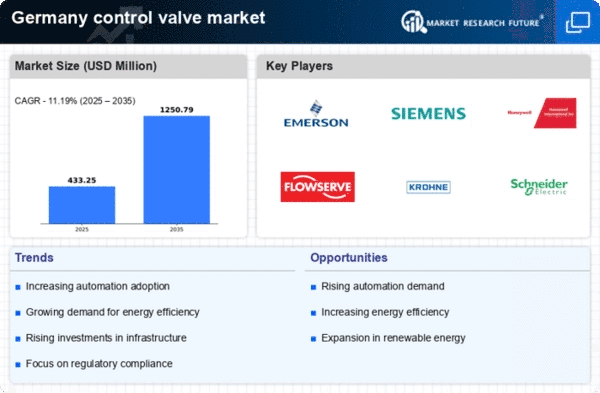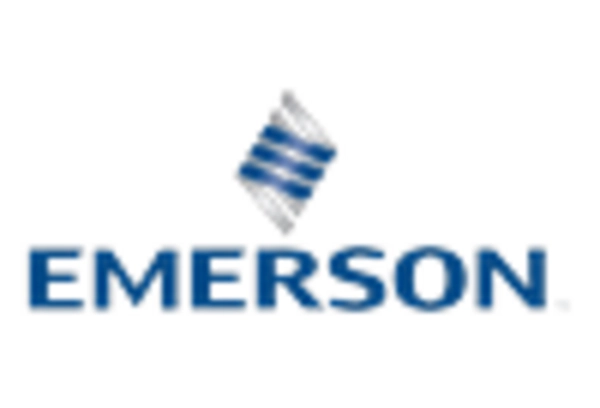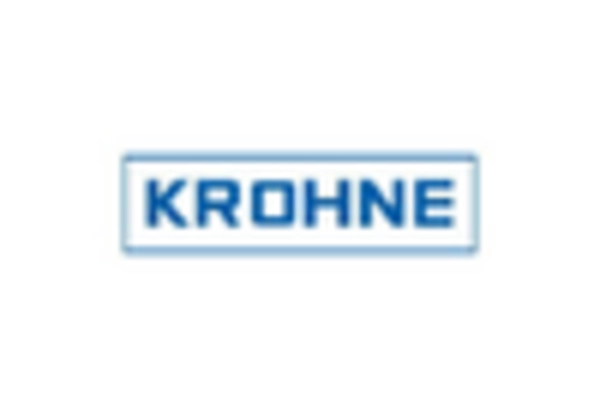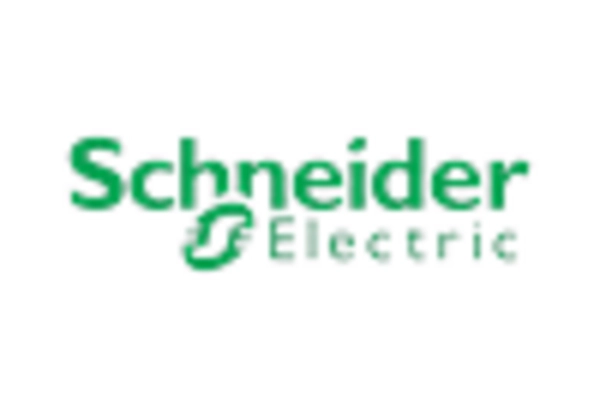Rising Industrial Automation
The control valve market in Germany is experiencing a notable surge due to the increasing adoption of industrial automation across various sectors. As industries strive for enhanced efficiency and productivity, the demand for automated control systems, including control valves, is on the rise. In 2025, the automation market in Germany is projected to grow by approximately 8%, which directly influences the control valve market. This trend is particularly evident in manufacturing, where precision and reliability are paramount. The integration of advanced control systems necessitates the use of sophisticated control valves, thereby driving market growth. Furthermore, the push towards Industry 4.0 is likely to further propel the demand for smart control valves, which can seamlessly integrate with automated systems, ensuring optimal performance and reduced operational costs.
Growth in Renewable Energy Sector
The burgeoning renewable energy sector in Germany is emerging as a crucial driver for the control valve market. With the country's ambitious goals to transition to sustainable energy sources, there is a heightened demand for control valves that can efficiently manage the flow of fluids in renewable energy applications, such as wind and solar power plants. In 2025, investments in renewable energy are expected to reach €30 billion, which will likely create substantial opportunities for control valve manufacturers. These valves play a vital role in ensuring the safe and efficient operation of energy systems, thus driving their demand. As the renewable energy landscape evolves, the control valve market is poised to benefit from innovations tailored to meet the specific needs of this sector, potentially leading to enhanced performance and reliability.
Environmental Regulations and Compliance
Germany's stringent environmental regulations are significantly impacting the control valve market. The government has implemented various policies aimed at reducing emissions and promoting sustainable practices across industries. As a result, companies are increasingly investing in control valves that comply with these regulations, which often require advanced features such as leak-proof designs and enhanced flow control capabilities. The market for control valves that meet these environmental standards is expected to grow by around 10% in the coming years. This shift not only reflects a commitment to sustainability but also indicates a growing awareness among manufacturers of the importance of compliance in maintaining their operational licenses. Consequently, the control valve market is likely to see a rise in demand for products that align with these regulatory frameworks, thereby fostering innovation and development within the industry.
Increased Investment in Water Management
The control valve market in Germany is witnessing growth driven by increased investment in water management systems. As water scarcity becomes a pressing issue, the government and private sectors are focusing on improving water infrastructure and management practices. Control valves are essential components in water distribution and treatment systems, ensuring efficient flow regulation and pressure control. In 2025, investments in water management are expected to exceed €5 billion, creating a substantial demand for control valves. This trend highlights the importance of reliable and efficient control systems in managing water resources effectively. As the focus on sustainable water management intensifies, the control valve market is likely to see innovations aimed at enhancing the performance and reliability of valves used in these critical applications.
Technological Advancements in Valve Design
Technological advancements in valve design are significantly influencing the control valve market in Germany. Innovations such as advanced materials, smart actuators, and enhanced control algorithms are enabling the development of more efficient and reliable control valves. These advancements not only improve the performance of control valves but also reduce maintenance costs and downtime for industries. In 2025, the market for technologically advanced control valves is projected to grow by approximately 12%, reflecting the increasing demand for high-performance solutions. As industries seek to optimize their operations, the adoption of these advanced control valves is likely to become more prevalent. This trend indicates a shift towards more sophisticated control systems that can adapt to varying operational conditions, thereby enhancing overall efficiency and productivity.
















